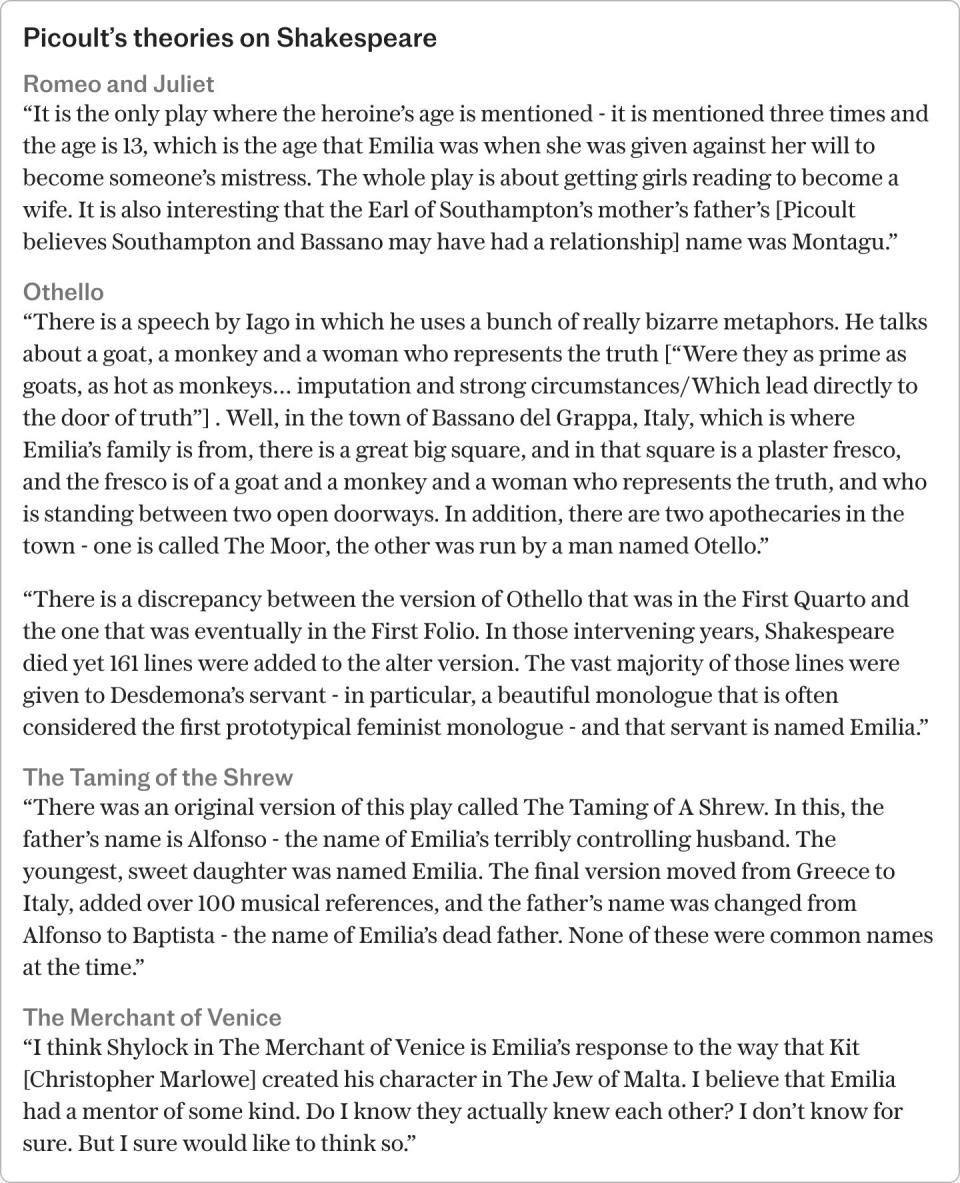According to American writer Jodi Picoult, Shakespeare’s plays were written by a woman and clues were present in Romeo, Juliet and Othello.
Picoult, whose books have sold 40 million copies, turned his attention to Ozan in his latest novel. He supports the theory that Emilia Bassano, poet and contemporary of William Shakespeare, was the real author of many works.
For example, he talks about the fact that the character Juliet is 13 years old; This is the age at which Bassano was forced to become someone’s mistress.
The reference to “goats and monkeys” in Othello corresponds to a fresco in the Italian town of Bassano del Grappa, home of Bassano’s family, while Desdemona’s servant is named Emilia.
Picoult also identifies Bassano’s hand in The Merchant of Venice and The Taming of the Shrew, but claims that Bassano had to conceal her authorship because she was a woman.
‘Proto-feminist’ characters
He believes there is ample evidence that Shakespeare did not write these works; At worst, she says, a man who doesn’t secure his daughters’ education can’t possibly write “proto-feminist” characters.
Moreover, Picoult says, Shakespeare’s contemporaries knew that he was not the real author.
“I think people in theater at the time knew that William Shakespeare was a generic name for many different types of writers. I guess they expected this to be a joke that everyone would understand. And for 400 years we’ve all lost the punch line,” he told the audience at the Hay Festival while promoting his novel By Another Name.
He added that the British public was resistant to the theory. “Shakespeare went beyond being a playwright; Sometimes I think it’s a religion. And if you talk to religious people and insist hard enough, eventually the answer will be: ‘Because that’s what it is!’ There is a blind faith in Shakespeare.
“Shakespeare has become a cottage industry in this country… and that has little to do with the actual playwright and more to do with preserving public pride in times of need. “This is how tea towels with Shakespeare’s face came about.”
‘Anti-Stratford’
The novel features dual timelines. Someone is interested in Bassano because he is secretly working on plays and sonnets. Another takes place in the present day, when a descendant of Bassano fights sexism in the theater world, this time on Broadway.
The debate over authorship includes theories that the books were written by Sir Francis Bacon, Christopher Marlowe, or Edward de Vere, 17th Earl of Oxford. Bassano’s name is a relatively new addition to the list.
In his acknowledgments, Picoult thanks Sir Mark Rylance, actor and former artistic director of Shakespeare’s Globe, a famous “anti-Stratford”.
Picoult, author of My Sister’s Keeper, studied Shakespeare at university but did not think about writing until she read an article by journalist Elizabeth Winkler, who named Bassano as a possible author of the works.
“HE [Winkler] He said something in the article that prevented me from dying. He said Shakespeare had two surviving daughters and that he did not teach them to read or write. I said: Oh, no, no, no. The man who wrote these characters must have taught his daughters to read. And that sent me down a rabbit hole.
Picoult describes Beatrice in Much Ado About Nothing, Rosalind in As You Like It, Katherina in The Taming of the Shrew, and Portia in The Merchant of Venice as examples of “incredible proto-feminist characters” showed as.

He explained that other details from Shakespeare’s life made him suspicious. “We know he didn’t travel at all because there were really good records of people leaving the country with that status, but he still managed to write about places like Italy, Egypt and Denmark in detail not found in guidebooks at the time.
“We know he didn’t play any musical instruments, but there are over 3,000 – very specific – references to music in Shakespeare’s plays. We know he was self-taught, which is great, but when he died he didn’t own a single book.
“When he died he wasn’t buried in Westminster Abbey, although many playwrights you don’t know are buried in Westminster Abbey. And when he died, no other playwright of the time publicly mourned him or spoke of his legacy.
“The only thing we don’t know about Shakespeare is that he put quill to paper.”
While Picoult said he did “tons of research” to support his theories and cited dozens of sources in his novel, he took a step forward by claiming that Bassano wrote Sonnet 18 in his novel: “Shall I compare you to a summer day?” ?” – and framed it as a mourning poem in memory of his daughter, who died in infancy.
“When you read it as a child loss poem, you will never read it the same way again,” he said.
In 1611, at the age of 42, Bassano became the first female poet to have her book published in England. Picoult said: “Writers don’t magically appear in their 40s. Authors write. “I believe he wrote it, I just don’t believe he wrote it under his own name.”